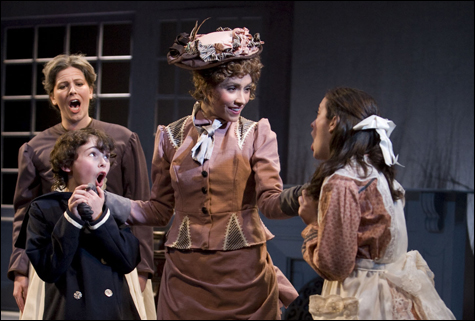
THE TURN OF THE SCREW: Astounding, phenomenal, superb were adjectives that came to mind. |
Some weeks Boston has such musical riches, one wouldn’t want to be anywhere else. After a slow start to 2008, we’ve been treated to superlative concerts of contemporary chamber music and big orchestral events, intimate soirees of theater and cabaret songs, and a powerful production of a modern opera classic. Who needs to go to New York?
James Levine returns to lead the Boston Symphony Orchestra this week, but in his absence, two guest conductors have delivered the goods. Charles Dutoit was back with a satisfying program that began with Swiss composer Frank Martin’s elegant and unsettling Petite symphonie concertante, for harp (Ann Hobson Pilot), harpsichord (Mark Kroll), piano (Randall Hodgkinson), and two string orchestras (the BSO). Sir Colin Davis led it last at Symphony Hall in 1984 (with Pilot and Kroll), and Dutoit led it at Tanglewood in 1990. It was refreshing to hear the offbeat accents of Martin’s inexorable machine, though one could imagine it all being more overtly seductive or insinuating.

It’s almost always a treat to hear the Cubist angles and memorable tunes of Prokofiev’s First Violin Concerto. Dutoit and the 31-year-old German virtuoso Viviane Hagner (in her BSO debut) kept it from wading in saccharine. In 1923, it was considered all but unplayable. Now it’s tossed off with almost too much abandon. The great performances (Joseph Szigeti under Sir Thomas Beecham is the benchmark) are also meditative and daringly exploratory; this one was merely enjoyable.
The big hit was Saint-Saëns’s Third Symphony, the “Organ Symphony,” with BSO organist James David Christie, providing the reverberating buzz of the newly refurbished Symphony Hall organ not only in the magnificent, grandiloquent outbursts but also in the quieter undercurrents (like a cellphone on mute vibrating in your pocket). Dutoit and the orchestra made this frequently trudged-out warhorse seem like a young stallion.
British conductor Mark Elder led a gripping version of a real rarity: Shostakovich’s Symphony No. 4, withdrawn (with Stalin’s encouragement) before its premiere in 1936 and finally resurrected in 1961 (the BSO’s only previous performance was 30 years ago). It’s more than an hour long and has Shostakovich’s largest orchestra (six flutes and/or piccolos; eight horns — though Elder used nine). The composer called it his artistic credo. Two long, complex movements surround a short scherzo-like Moderato con moto. But it’s constantly veering from shrieks of agony to laughing carnival calliope, never staying in the same place for long. If you compared it to a painter, Hieronymus Bosch might come to mind. The playing, with antiphonal first and second violins, ranged from ticklish to brutal but was always clear and pointed, even delicately pointillist. Elder spoke to the audience before the downbeat, and his excitement about the piece seemed to galvanize both the players and the audience. And perhaps himself as well.
This was preceded by a hollow rendition of the Sibelius Violin Concerto with 37-year-old Russian virtuoso Vadim Repin playing as if the sound of his instrument were more important — much more important — than Sibelius’s music. It was an extroverted, externalized version of a piece that continues to engage because of its mysterious inwardness. Repin steamrollered over Elder’s unpointed accompaniment. The only profile in view was Repin’s.
Collage New Music, under David Hoose, completed the second of its two tributes to the late Luciano Berio with a kaleidoscopic evening that encompassed early (1958) and later (1971) works, short (the minute-and-a-half Autre fois, played twice) and longer, solos (the Sequenzas for flute and for harp), chamber, and vocal music, esoteric (Circles, Berio’s labyrinthine 1960 settings of e.e. cummings) and popular (the irresistible 1964 Folk Songs). As Hoose himself pointed out, it was hard to believe these are all works by the same composer except that they all sound “like Berio.” Christopher Krueger was the adventurous flutist, Franziska Huhn the imaginative harpist; the mezzo-soprano was Janna Baty, who doesn’t sing a note that doesn’t come to life.
The opera was Boston Conservatory’s student production of Benjamin Britten’s last, most condensed, and most haunting (it’s the only word) operatic masterpiece, The Turn of the Screw, with a libretto by Welsh poet Myfanwy Piper that turns Henry James’s famous ghost story into a profound and dramatic exploration of the complex intersection of sexuality, imagination, and repression. The efficient staging by Kirsten Z. Cairns didn’t entirely solve the problem of how to depict the ghosts. It was a clever and creepy touch to show the impression of the devilish Peter Quint’s face pushing through a wall, but at other times the ghosts just walked on and stood around. Still, the second act was the most chilling and moving version of this opera I’ve seen.
Except for the astounding young tenor Stephen Chambers as Quint, the role Britten created for the astounding Peter Pears, there were two casts. My night, the other standouts were full-voiced Beth Lytwynec as Mrs. Grose, the gullible housekeeper; soprano Kristen Simchik increasingly intense as the increasingly torn governess “lost in my labyrinth”; and the phenomenal boy soprano Kyle McAdam as young Miles, whose sweet voice and violent body movements put him at the center of a fatal tug of war. The superb Karl Paulnack, leading the best student orchestra I’ve yet heard at the Boston Conservatory, sucked me into this convulsive dilemma and left me limp and shattered.